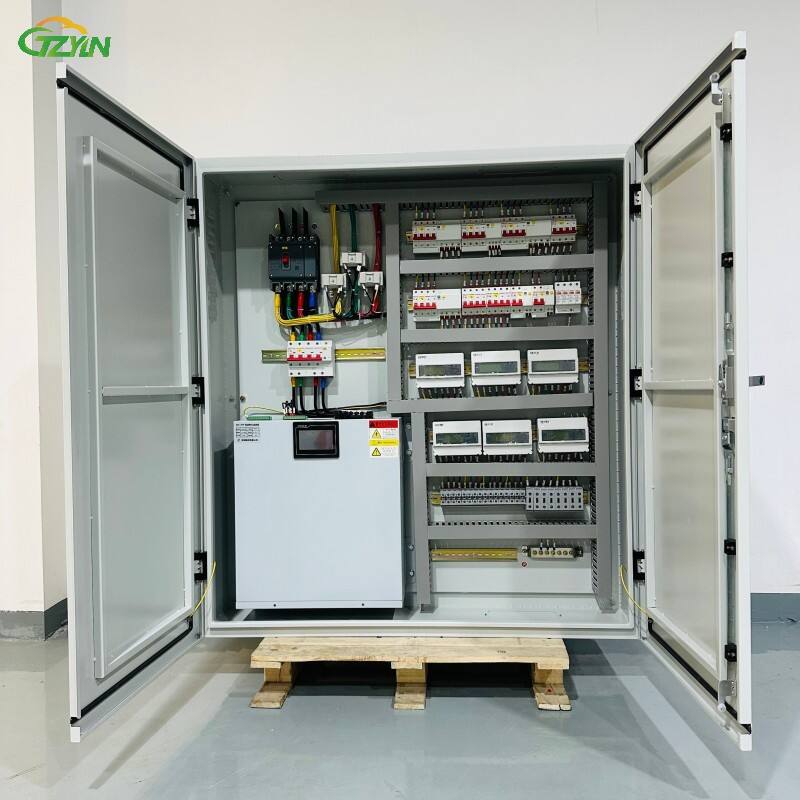Introduction to Metering Cabinets in Energy Optimization
The Role of Metering Cabinets in Modern Energy Management
Metering cabinets are pivotal in the realm of modern energy management. They function as a centralized hub for gathering energy data from various systems, granting businesses the capability to conduct real-time monitoring of their energy consumption. This comprehensive oversight facilitates not only energy efficiency improvements but also significant cost savings. Moreover, metering cabinets are integral to the seamless integration of diverse energy sources, thereby enhancing both management and efficacy. Their ability to monitor the entire energy distribution network empowers organizations to pinpoint inefficiencies and identify sectors primed for improvement. As energy optimization becomes increasingly crucial, metering cabinets stand at the forefront, driving strategic energy utilization across industries and enhancing overall energy efficiency.
Key Components of Effective Energy Monitoring Systems
To ensure accurate data collection and analysis, an effective energy monitoring system encompasses several critical components. These include metering devices, data loggers, and communication networks. These components, housed within metering cabinets, allow for the integration of real-time tracking devices with software tools, facilitating comprehensive reporting and performance analytics. Such systems are designed to be scalable, providing the infrastructure necessary to accommodate future energy monitoring requirements. By implementing these systems, businesses can not only conduct detailed assessments of their energy usage but also adapt to evolving energy demands, ensuring long-term efficiency and optimization.
Why Energy Optimization Matters for Businesses
For businesses, energy optimization is a key driver of success, offering substantial cost reductions and facilitating more effective resource allocation. By embracing energy efficiency, companies bolster their sustainability initiatives, thereby enhancing their corporate responsibility and brand reputation. Furthermore, organizations that prioritize energy optimization are better equipped to navigate the increasingly stringent regulatory environment. These efforts not only foster a culture of environmental stewardship but also position businesses to thrive amid evolving market conditions, ensuring compliance and fostering long-term competitiveness.
Accurate Energy Monitoring for Informed Decisions
Real-Time Data Collection and Analysis
Implementing systems for real-time data collection provides immediate visibility into energy consumption patterns, which is crucial for businesses aiming to enhance energy efficiency. These systems allow for constant monitoring of energy use, enabling instant identification of any surges in consumption or anomalies. Effective analysis tools are vital, as they distill the collected data into actionable insights for decision-makers. With real-time insights, businesses can make informed adjustments to reduce waste and optimize energy usage. According to industry reports, businesses utilizing real-time monitoring have successfully reduced energy costs by up to 20%, showcasing the financial benefits of such systems.
Granular Insights into Consumption Patterns
Granular data collection allows businesses to pinpoint specific usage trends, leading to more informed operational decisions. By analyzing consumption data at various times or focusing on specific equipment, organizations can identify inefficiencies and areas for improvement. This level of detail helps in optimizing processes and reducing energy waste. Studies have demonstrated that leveraging granular insights can lead to an average increase of 15% in energy efficiency. Such improvements not only reduce operational costs but also contribute to broader sustainability goals.
Detecting Anomalies in Energy Usage
Energy monitoring systems equipped with anomaly detection capabilities can automatically alert managers to unexpected spikes or drops in energy consumption. This feature is crucial for timely intervention, allowing for quick investigation and resolution of issues that could otherwise lead to higher energy costs. Continuous monitoring is recommended by experts to maintain optimal performance levels across all energy-consuming systems. By detecting deviations from normal usage patterns, businesses can ensure their energy systems operate efficiently, ultimately leading to significant cost savings and increased operational reliability.
Identifying and Eliminating Energy Waste
Pinpointing High-Demand Periods
Effective analysis of usage data is essential for identifying peak demand periods, allowing businesses to fine-tune their energy pricing strategies. By understanding when energy consumption peaks, organizations can strategically shift their usage to off-peak times, leading to significant savings. Implementing such strategies is crucial for achieving overall operational efficiency, as well-timed energy usage can reduce costs while maintaining productivity.
Addressing Phantom Loads and Leakages
Identifying phantom loads — devices that consume energy even when turned off — is crucial for reducing waste. Utilizing meter readings from metering cabinets can ensure accurate detection of these inefficiencies. By addressing phantom loads and energy leakages, organizations can save between 5-10% on their annual energy bills. This proactive approach ultimately contributes to energy waste reduction and increased cost-efficiency.
Optimizing Inefficient Equipment Workflows
Monitoring equipment workflows helps mitigate significant energy waste, and data from metering cabinets is pivotal in achieving this. By leveraging detailed data insights, businesses can optimize equipment performance and reduce operational inefficiencies. Reports indicate that optimizing workflows can enhance productivity by up to 30%, alongside achieving considerable energy savings. Such enhancements are crucial for maximizing output while minimizing unnecessary energy consumption.
- Smart meters go beyond traditional metering by providing detailed information on energy usage patterns, helping homeowners make informed choices that reduce costs and environmental impact.
Cost Reduction Through Strategic Energy Management
Leveraging Time-of-Use Pricing Models
Time-of-use pricing models present businesses with a compelling opportunity to reduce energy costs. These models allow companies to pay less for electricity during off-peak hours, significantly impacting overall savings. By closely examining consumption patterns, a business can strategically shift its energy-intensive operations to times when electricity prices are lower, thus maximizing cost-efficiency. According to industry data, businesses that adeptly navigate these models can achieve savings between 10% and 25% on their energy bills.
Implementing Demand Response Programs
Implementing demand response programs is an effective strategy for businesses to manage energy costs during peak periods. These programs incentivize companies to decrease their energy usage when demand is highest, often through financial compensation or reduced rates. This not only helps in reducing operational costs but also can generate additional revenue streams, creating a dual benefit. Research indicates that participants in demand response initiatives frequently enjoy cost savings ranging from 20% to 30%, making it a lucrative option for energy-conscious businesses.
Avoiding Penalties via Regulatory Compliance
Ensuring compliance with energy regulations is essential for avoiding costly penalties and fines. Many businesses face challenges in accurate energy reporting, which can lead to non-compliance. However, utilizing precise monitoring techniques, such as those provided by metering cabinets, can significantly mitigate these risks. As experts in regulatory compliance attest, maintaining adherence to energy standards can prevent penalties amounting to up to $50,000 annually. Therefore, regular monitoring and accurate reporting are crucial components of a cost-effective energy management strategy.
Integration with Smart Energy Systems
Advanced Metering Infrastructure (AMI) Compatibility
Advanced Metering Infrastructure (AMI) enhances the capability for smart meters to communicate seamlessly with energy providers, allowing for robust monitoring and control of energy usage. By implementing AMI, businesses can attain precise data accuracy, which in turn helps to streamline operational costs. This advanced communication system is pivotal in optimizing energy consumption patterns. Research indicates that firms leveraging AMI witness improved energy efficiency, achieving enhancements up to 15%. This improvement not only aids in cost reduction but also supports sustainable energy practices.
IoT and Automation for Predictive Adjustments
Integrating IoT devices into energy management systems enables businesses to make real-time adjustments in energy usage according to consumption data. This setup not only introduces a level of automation in predictive adjustments, resulting in optimized energy performance but also minimizes the need for manual oversight. According to tech analysts, the implementation of IoT can lead to an impressive 18% reduction in energy costs. This is largely due to the fact that these automated systems ensure energy is utilized only when and where it is needed, avoiding wastage.
Cloud-Based Analytics for Long-Term Savings
Cloud-based analytics play a crucial role in offering long-term forecasting capabilities, assisting organizations in better planning for their future energy requirements. By adopting cloud solutions, businesses can benefit from scalable data storage, which is essential for extensive energy usage analysis. Studies reveal that organizations that incorporate cloud analytics into their energy management strategies can reduce their total energy costs by approximately 20%. This is achieved through the data-driven insights and strategies formed from in-depth analyses, ensuring businesses can act on predictive trends and avoid excessive energy consumption.
FAQ Section
What are metering cabinets?
Metering cabinets are centralized hubs for collecting energy data from various systems, allowing for real-time monitoring and improved energy management.
Why is energy optimization important for businesses?
Energy optimization helps businesses reduce costs, comply with regulations, and enhance sustainability initiatives, which are key to long-term success and competitiveness.
How do anomaly detection systems help in energy monitoring?
These systems automatically alert managers to unusual energy consumption patterns, allowing for quick intervention to reduce waste and prevent cost spikes.
What is Advanced Metering Infrastructure (AMI)?
AMI enhances the communication between smart meters and energy providers, resulting in more accurate data collection and control over energy usage.




